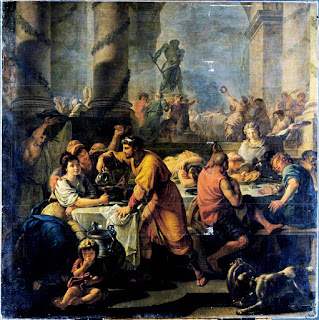Carnival Venice
It’s Carnival time! The exact dates of these traditional celebrations vary from one year to the next. They usually begin just before the Christian observance of Lent between February and early March.
Carnival Entierro de la Sardina
credits: Goya, painting
Real Academia de Bellas Artes de San Fernando, 1812-14
They generally start on a Thursday and end the following Tuesday, often referred to as Shrove Tuesday or Mardi Gras. In some parts of the world, revelers on the day following carnival practice the ritual Burial of the Sardine.
It has many names, including Fat Tuesday, Mardi Gras (France), the Tuesday of Carnival, and Pancake Day.
Carnaval Nice
Although deeply rooted in the past, Carnival remains very much alive, and continues to evolve.
Carnivals offer local authentic traditions or adaptations and mixes of practices such as the wearing of masks and costumes and the holding of parades, and street parties.
Carnival always suggests licence, reveling and a reversal of ordinary rules. They often feature pre-Christian elements and traditions such as the Roman Saturnalia and other festivities that honoured Dionysus or Bacchus in Antiquity. In the Americas, carnivals present elements of ancient celebrations rooted in pre-Columbian or African traditions.
Saturnalia
credits: Antoine Callet, 1783
Anthropologists generally consider carnival to be an heir to the ancient celebrations of the end of winter and the imminent arrival of spring.
From Oruro in Bolivia, through Recife in Brazil, Barraquilla in Colombia, El Callao in Venezuela, to Belgium and Austria, Croatia and Hungary, and Portugal many festivities figure on the Representative List of Intangible Cultural Heritage of Humanity for us to discover.
Kids mask
via Pinterest
Education:
The inscription of Carnival for the Safeguarding of the Intangible Cultural Heritage on the Representative List of the Intangible Cultural Heritage of Humanity is a recognition of the festival’s fundamental role in society."
It provides visibility for the intangible cultural heritage making people and students aware of its significance, as well as encourages dialogue respective of cultural diversity.
Transmitted from generation to generation, Carnival is constantly recreated by groups and communities and its practices change over time.
Schools are closed. Discover the carnival parades in your city and participate with your kids. What a better entertainment for families? Share some traditions with your kids. Don't forget the carnival costumes and masks.
The 'Jecken' of Cologne's Carnival
credits: DPA
Resources:
Discover the carnivals and festivals inscribed on the Representative List of the Intangible Cultural Heritage of Humanity!
Inscription on this List provides better visibility for the intangible cultural heritage making people aware of its significance, as well as encourages dialogue respective of cultural diversity.
G-Souto
02.03.2019
Copyright © 2019G-Souto'sBlog, gsouto-digitalteacher.blogspot.com®

Schools : Carnival : Origines & traditions by G-Souto is licensed under a Creative Commons Attribution-NonCommercial-NoDerivatives 4.0 International License





No comments:
Post a Comment